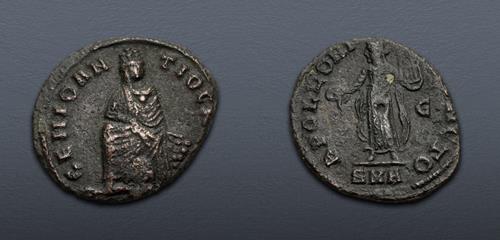|
temp. Maximinus II. AD 310-313. Æ (15.5mm, 1.45 g, 5h). “Persecution” issue. Antioch mint, 5th officina. Struck circa AD 312. GENIO AN TIOCH[ENI], towered and draped Tyche of Antioch seated facing; below, river-god Orontes swimming / APOLLONI [SA]NCTO, Apollo standing left, holding patera and lyre; –|Є//SMA. Van Heesch, Last 3a; McAlee 170a; Vagi 2954. Dark brown patina, light roughness. VF.
Following the death of Galerius in AD 311, his Caesar, Maximinus II, who had declared himself Augustus the previous year, took control of Asia Minor and the Levant. Apparently a strident persecutor of the Christian minority (Lactant. De mort. pers. 36-49; Euseb. Hist. eccl. 9), he was compelled under the dictates of the edict of toleration to relax the persecutions. At the same time, he was approached by embassies of various cities now under his control. Among these were delegations from the major cities of Nicomedia and Antioch, who requested that in no way should Christians be permitted to continue to live in their cities and districts. Antioch went so far as to erect a statue of Zeus Philios, which delivered oracles condemning the Christians (Euseb. Hist. eccl., op. cit.). Encouraged by this apparent groundswell of popular support, Maximinus personally appointed pagan priests and sent copies of a document relating the memoirs of Pontius Pilate (cf. Euseb. Hist. eccl., 2.2). He sentenced some of the most notable preachers in his districts to death.
Possibly fearing repercussions from Constantine I and Licinius I, Maximinus unexpectedly rescinded his persecutions in December AD 312. Hoping to hold on following his defeat by Licinius in April AD 313, Maximinus in May AD 313 issued his own edict, restoring property and privileges to his Christian subjects.
This did not, however, have the desired effect, for in July or August of that same year, after having again been defeated by Licinius, Maximinus died at Tarsus.
From these events as recorded by Eusebius, it is clear that the persecution of Maximinus was prompted not by imperial policy, but by the cities themselves, whose wealth and economy depended on the maintenance of local pagan religious activities, which included oracles, sanctuaries, and games and festivals. In addition, Maximinus relied heavily on these cities for income. Given this situation, it is easy to see why Maximinus acquiesced to persecuting the Christian segment of the local population. The civic issues of Nicomedia, Antioch, and Alexandria reflect the political arrangement between the emperor and the cities. Their typology and legend indicate a potential imperial initiative, and the numerous issues that indicate a large quantity being struck (particularly at Antioch), must coincide with the anti-Christian activities there.
Closing Date and Time: 1 December 2021 at 12:46:40 ET.
All winning bids are subject to an 18% buyer’s fee.
|
